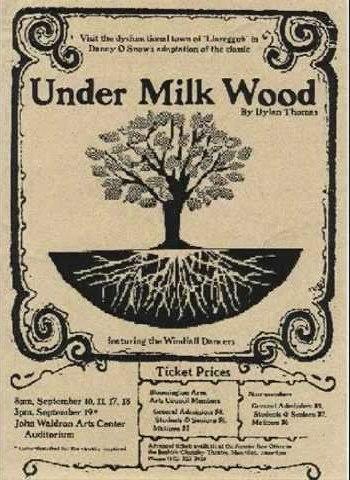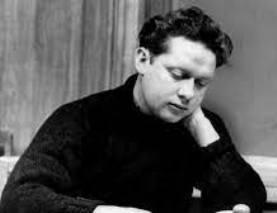THREE SCORE YEARS AND TEN – Under Milk Wood seventy years on: an appreciation by Kevin Saving


May the Fourteenth, Two Thousand and Twenty Three, marked the seventieth anniversary of Dylan Thomas’ famous ‘play for voices’ first public performance – at least in something close to its currently accepted form – in The Poetry Center, New York.
Legend has the writer being locked-up in his room by one of Center’s staff (his sometime lover, Liz Reitell) in order to complete the piece on time. The final scripts were handed to the performers as they applied their make-up, just prior to ‘going on’. Although initially received in silence, this debut performance was eventually honoured by fourteen curtain-calls: the audience hadn’t quite grasped, early on, just what they were getting. Thomas, who left the venue alone, would readily agree to the provision of a fully revised script but, of course, he never lived to finalise it – dying of alcoholic overindulgence (and medical incompetence) less than six months later.
There is a recording still in existence of this theatrical debut, with Thomas himself taking the part of ‘First Voice’ (or Narrator) – a role later made his own by the young Richard Burton, who knew the writer socially but seems not much to have liked him. The classic (1954) B.B.C. Third Programme version is thoroughly improved by this, necessary, substitution. Thomas was always inclined to ‘ham’ things up. He would habitually greet his fellow poet, the Overseas Literary Producer (and future cricket broadcaster) John Arlott, by asking if he (Arlott) needed someone ‘to Boom’ for him. Thomas – contrary to myth – affected a somewhat plummy English accent for his radio work. He would call Under Milk Wood ‘prose with blood pressure’.
The origins of the play are similarly shrouded in Thomasian mytholgy. Old school friends would later recall him mentioning a similar project way back in the Thirties. One, Daniel Jones, would go on to set the songs to music. More persuasively, Thomas would recount having been inspired by the basic idea whilst living in his bungalow, ‘Majoda’ (its walls, he said “bum-paper thin”), close to the Cardiganshire town of New Quay, in 1944. ‘Quite Early One Morning’ (which serves as a kind of prototype) would be recorded for B.B.C. Wales that December. To start with, he felt that the town should be depicted as ‘Mad’.
New Quay and Laugharne (pronounced ‘Larn’) vie for their laurels as the originals of the small Welsh fishing village, ‘Llareggub’, (‘bugger all’ spelt backwards). A real-life ‘Rosie Probert’ was once resident in Laugharne but ‘Cherry Owen’ was fairly definitively based on the New Quay builder, Dan ‘Cherry’ Jones. Whether the ‘Sailor’s Arms’ was ever really Laugharne’s ‘Brown’s hotel’ no one, now, can ever truly know…
In early versions of the script, Llareggub was spelt ‘Llaregyb’. Thomas certainly sailed pretty close to the wind in those far-off, prudish, Fifties. Captain Cat muses to his dead lover, Rosie
The only sea I saw was the see-saw sea, with you riding on it. Lie down, lie easy -let me shipwreck in your thighs.
The warring couple, Mr and Mrs Pugh, are two of the great comic creations. She, a
needling, stalactite hag and bed-nag of a poker-backed, nutcracker wife
he, with his
nicotine, egg-yellow, weeping walrus Victorian moustache worn thick and long in memory of Dr Crippen.
And, always, there is the poetry. Whether it is the lush, punning, compound-adjectival ‘impasto’ of the prologue, lisping
down to the slow, black, sloe-black, crow-black, fishing boat bobbing sea
or the observational incongruence of
The owls are hunting. Look: over Bethesda gravestones one hoots and swoops and catches a mouse by ‘Hannah Rees, Beloved Wife’
Just as in The Canterbury Tales, all humanity is here – if you care to listen for it. Under Milk Wood is as fully achieved as anything by Shakespeare: as timeless, as great and much, much funnier. All that prevented Thomas from reaching comparable heights of sustained grandeur was a chronic personal indiscipline. He is known to have lost/misplaced the play’s manuscript on at least three separate occasions.
We won’t need Mrs Dai Bread Two’s chrystal ball to project how, if Dylan Thomas had lived, the Sixties and Seventies would have dropped their baubles at his feet; how a burgeoning TV-culture would have quickly reckoned him a ‘Natural’ performer. And Oh how he would have enjoyed hob-nobbing with The Beatles, The Stones (and another Dylan too) before –most likely!- stealing their shirts. Certain aspects of his humour (P.C. Attila Rees peeing into his helmet, for example) prefigure the anti-authoritarian, surrealist comedy of the Monty Python era. Would we have had more works of similar stature? Sadly, this appears unlikely. By the end, Thomas had run out of ideas almost as completely as he had run out of time. Under Milk Wood – alongside perhaps a handful of lucid poems – will remain his magnum opus. Both facetious (and poignant), sagacious (and sexy), affectionate (and affecting) it will long survive its author. Happy birthday, sweet buggeralL.
May 14 2023
THREE SCORE YEARS AND TEN
THREE SCORE YEARS AND TEN – Under Milk Wood seventy years on: an appreciation by Kevin Saving
May the Fourteenth, Two Thousand and Twenty Three, marked the seventieth anniversary of Dylan Thomas’ famous ‘play for voices’ first public performance – at least in something close to its currently accepted form – in The Poetry Center, New York.
Legend has the writer being locked-up in his room by one of Center’s staff (his sometime lover, Liz Reitell) in order to complete the piece on time. The final scripts were handed to the performers as they applied their make-up, just prior to ‘going on’. Although initially received in silence, this debut performance was eventually honoured by fourteen curtain-calls: the audience hadn’t quite grasped, early on, just what they were getting. Thomas, who left the venue alone, would readily agree to the provision of a fully revised script but, of course, he never lived to finalise it – dying of alcoholic overindulgence (and medical incompetence) less than six months later.
There is a recording still in existence of this theatrical debut, with Thomas himself taking the part of ‘First Voice’ (or Narrator) – a role later made his own by the young Richard Burton, who knew the writer socially but seems not much to have liked him. The classic (1954) B.B.C. Third Programme version is thoroughly improved by this, necessary, substitution. Thomas was always inclined to ‘ham’ things up. He would habitually greet his fellow poet, the Overseas Literary Producer (and future cricket broadcaster) John Arlott, by asking if he (Arlott) needed someone ‘to Boom’ for him. Thomas – contrary to myth – affected a somewhat plummy English accent for his radio work. He would call Under Milk Wood ‘prose with blood pressure’.
The origins of the play are similarly shrouded in Thomasian mytholgy. Old school friends would later recall him mentioning a similar project way back in the Thirties. One, Daniel Jones, would go on to set the songs to music. More persuasively, Thomas would recount having been inspired by the basic idea whilst living in his bungalow, ‘Majoda’ (its walls, he said “bum-paper thin”), close to the Cardiganshire town of New Quay, in 1944. ‘Quite Early One Morning’ (which serves as a kind of prototype) would be recorded for B.B.C. Wales that December. To start with, he felt that the town should be depicted as ‘Mad’.
New Quay and Laugharne (pronounced ‘Larn’) vie for their laurels as the originals of the small Welsh fishing village, ‘Llareggub’, (‘bugger all’ spelt backwards). A real-life ‘Rosie Probert’ was once resident in Laugharne but ‘Cherry Owen’ was fairly definitively based on the New Quay builder, Dan ‘Cherry’ Jones. Whether the ‘Sailor’s Arms’ was ever really Laugharne’s ‘Brown’s hotel’ no one, now, can ever truly know…
In early versions of the script, Llareggub was spelt ‘Llaregyb’. Thomas certainly sailed pretty close to the wind in those far-off, prudish, Fifties. Captain Cat muses to his dead lover, Rosie
The only sea I saw was the see-saw sea, with you riding on it. Lie down, lie easy -let me shipwreck in your thighs.
The warring couple, Mr and Mrs Pugh, are two of the great comic creations. She, a
needling, stalactite hag and bed-nag of a poker-backed, nutcracker wife
he, with his
nicotine, egg-yellow, weeping walrus Victorian moustache worn thick and long in memory of Dr Crippen.
And, always, there is the poetry. Whether it is the lush, punning, compound-adjectival ‘impasto’ of the prologue, lisping
down to the slow, black, sloe-black, crow-black, fishing boat bobbing sea
or the observational incongruence of
The owls are hunting. Look: over Bethesda gravestones one hoots and swoops and catches a mouse by ‘Hannah Rees, Beloved Wife’
Just as in The Canterbury Tales, all humanity is here – if you care to listen for it. Under Milk Wood is as fully achieved as anything by Shakespeare: as timeless, as great and much, much funnier. All that prevented Thomas from reaching comparable heights of sustained grandeur was a chronic personal indiscipline. He is known to have lost/misplaced the play’s manuscript on at least three separate occasions.
We won’t need Mrs Dai Bread Two’s chrystal ball to project how, if Dylan Thomas had lived, the Sixties and Seventies would have dropped their baubles at his feet; how a burgeoning TV-culture would have quickly reckoned him a ‘Natural’ performer. And Oh how he would have enjoyed hob-nobbing with The Beatles, The Stones (and another Dylan too) before –most likely!- stealing their shirts. Certain aspects of his humour (P.C. Attila Rees peeing into his helmet, for example) prefigure the anti-authoritarian, surrealist comedy of the Monty Python era. Would we have had more works of similar stature? Sadly, this appears unlikely. By the end, Thomas had run out of ideas almost as completely as he had run out of time. Under Milk Wood – alongside perhaps a handful of lucid poems – will remain his magnum opus. Both facetious (and poignant), sagacious (and sexy), affectionate (and affecting) it will long survive its author. Happy birthday, sweet buggeralL.